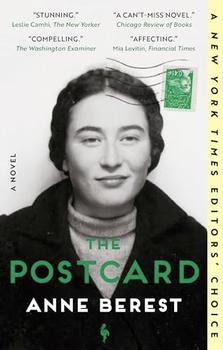Summary | Excerpt | Reviews | Beyond the book | Read-Alikes | Genres & Themes | Author Bio

"A masterpiece" (A.N. Wilson), this many-layered novel of WWII combines fiction with a Sebaldian collage of facts to explore the fate of Italian Jews under Nazi occupation, through the intimate story of a mother's search for her son
Haya Tedeschi sits alone in Gorizia, in northeastern Italy, surrounded by a basket of photographs and newspaper clippings. Now an old woman, she waits to be reunited after sixty-two years with her son, fathered by an SS officer and stolen from her by the German authorities as part of Himmler's clandestine Lebensborn project.
Haya reflects on her Catholicized Jewish family's experiences, dealing unsparingly with the massacre of Italian Jews in the concentration camps of Trieste. Her obsessive search for her son leads her to photographs, maps, and fragments of verse, to testimonies from the Nuremberg trials and interviews with second-generation Jews, and to eyewitness accounts of atrocities that took place on her doorstep. From this broad collage of material and memory arises the staggering chronicle of Nazi occupation in northern Italy.
Written in immensely powerful language and employing a range of astonishing conceptual devices, Trieste is a novel like no other. Daša Drndic has produced a shattering contribution to the literature of twentieth-century history.
Trieste is a brilliant, original conceptualized novel consisting of fragmented memories and a series of concentrated history lessons that will challenge a reader with its irregular construction and seeming lack of continuity. It may not be easy but it is well worth reading and will assuredly linger in memory...continued
Full Review
 (735 words)
(735 words)
(Reviewed by Linda Hitchcock).
 One cannot read Daša Drndić's compelling novel Trieste without being intrigued by its namesake - the affluent and cosmopolitan industrial seaport city of 200,000 residents with historically fluid national allegiances. Located in Italy on the remote northeastern borders of Slovenia and Croatia, Trieste has flown flags of many countries. For much of the 13th and 14th centuries it was variously at war with or occupied by Venice. In 1382 it became part of the Duke of Austria's domain (having petitioned to become so). Apart from relatively short periods of occupation by the Venetians and Napoleon, it stayed part of the Austro-Hungarian Empire, and became an important naval and shipbuilding center, until November 1918 when it was ...
One cannot read Daša Drndić's compelling novel Trieste without being intrigued by its namesake - the affluent and cosmopolitan industrial seaport city of 200,000 residents with historically fluid national allegiances. Located in Italy on the remote northeastern borders of Slovenia and Croatia, Trieste has flown flags of many countries. For much of the 13th and 14th centuries it was variously at war with or occupied by Venice. In 1382 it became part of the Duke of Austria's domain (having petitioned to become so). Apart from relatively short periods of occupation by the Venetians and Napoleon, it stayed part of the Austro-Hungarian Empire, and became an important naval and shipbuilding center, until November 1918 when it was ...

If you liked Trieste, try these:

by Anne Berest
Published 2024
Anne Berest's The Postcard is among the most acclaimed and beloved French novels of recent years. Luminous and gripping to the very last page, it is an enthralling investigation into family secrets, a poignant tale of mothers and daughters, and a vivid portrait of twentieth-century Parisian intellectual and artistic life.

by Jennifer Coburn
Published 2023
Three women, a nation seduced by a madman, and the Nazi breeding program to create a so-called master race.
The only real blind person at Christmas-time is he who has not Christmas in his heart.
Click Here to find out who said this, as well as discovering other famous literary quotes!